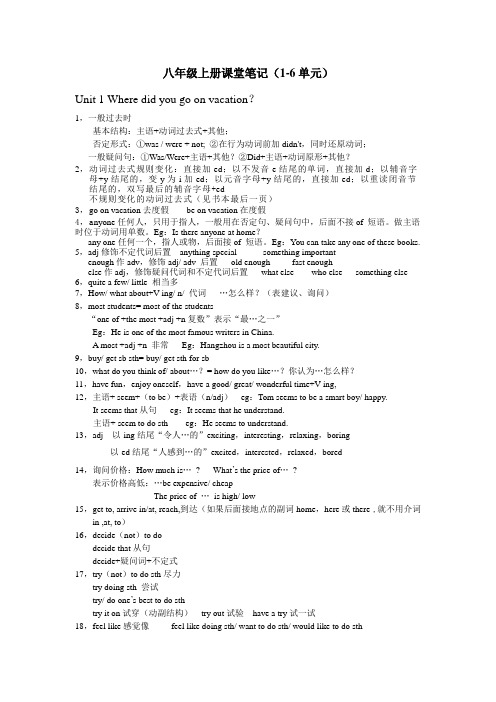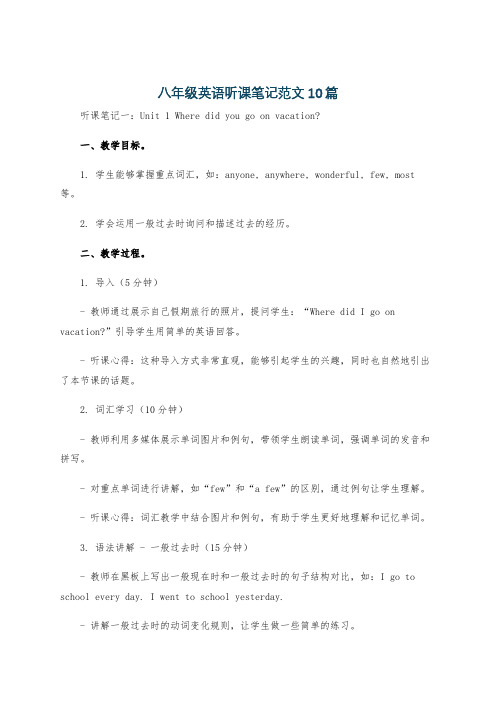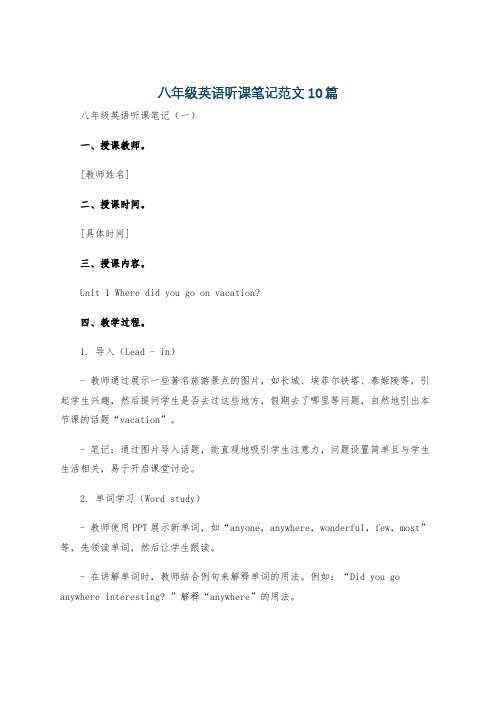八年级英语(全年)课堂教学笔记
英语8年级笔记

英语8年级笔记
以下是八年级英语的一些重要知识点和笔记:
1. 语法重点:过去进行时态(Past Continuous Tense)。
这个时态主要用来描述在过去某个时间点正在发生的动作。
基本结构是“was/were + 动词ing”。
2. 词汇重点:掌握一些常用的动词短语,如“turn on/off”、“take off”、“put on”等,以及一些常用的形容词短语,如“asleep”、“awake”等。
3. 语言点:学习如何使用副词来描述动作的方式,如“slowly”、“quickly”等。
同时,还要学习如何使用连词来连接两个句子,如“and”、“but”、“or”等。
4. 写作练习:练习写简单的段落,包括主题句、支持句和结论句。
同时,学习如何使用过渡词来使文章更加流畅。
5. 听力和口语练习:通过听英语歌曲、看电影等方式来提高听力和口语能力,同时学习一些常用的口语表达方式。
6. 阅读理解:通过阅读英文文章来提高阅读理解能力,同时学习一些阅读技巧,如预测文章内容、寻找主题句等。
7. 文化知识:了解一些英语国家的文化背景和习俗,如节日、饮食、礼仪等,有助于更好地理解和运用英语。
以上是八年级英语的一些重点知识点和笔记,希望能对你有所帮助。
人教版八年级英语上册笔记1--10单元

人教版八年级英语上册笔记1--10单元精心整理超详细!人教版八年级英语上册笔记1--10单元Unit 1 Where did you go on vacation ?Section A 知识提纲一、词形变化1.wonder v. 想知道→adj. wonderful 精彩的,绝妙的二、短语1.go on vacation去度假2.stay at home待在家里3.go to the mountains去爬山4.go to the beach去海滩5.visit museums 参观博物馆6.go to summer camp去参加夏令营7.quite a few相当多 8.study for tests为测验而学习9.go out出去 10.go out with anyone 跟别人出去11.most of the time大部分时间 12.of course=sure =certainly 当然13.have a good time doing=have fun doing =enjoy oneself 玩得高兴14.go shopping去购物 15. keep a diary 写日记三、词法1. buy sb. sth.=buy sth. for sb.为某人买某物Buy me some books = Buy some books for me .2.taste / look/sound/smell good. 尝起来/看起来/听起来/闻起来不错3.nothing…but+动词原形除了……之外什么都没有I have nothing to do but watch TV all day .我整天除了看电视什么也没干。
4.seem link v.(系动词) 似乎,好像,看来① seem + adj.② seem to do sth.③ It seems that + 陈述句5.Long time no see . 好久不见。
八年级上册英语课堂笔记(1-6单元)

八年级上册课堂笔记(1-6单元)Unit 1 Where did you go on vacation?1,一般过去时基本结构:主语+动词过去式+其他;否定形式:①was / were + not; ②在行为动词前加didn't,同时还原动词;一般疑问句:①Was/Were+主语+其他?②Did+主语+动词原形+其他?2,动词过去式规则变化:直接加ed;以不发音e结尾的单词,直接加d;以辅音字母+y结尾的,变y为i加ed;以元音字母+y结尾的,直接加ed;以重读闭音节结尾的,双写最后的辅音字母+ed不规则变化的动词过去式(见书本最后一页)3,go on vacation去度假be on vacation在度假4,a nyone任何人,只用于指人,一般用在否定句、疑问句中,后面不接of 短语。
做主语时位于动词用单数。
Eg:Is there anyone at home?any one任何一个,指人或物,后面接of 短语。
Eg:You can take any one of these books. 5,adj修饰不定代词后置anything special something importantenough作adv,修饰adj/ adv 后置old enough fast enoughelse作adj,修饰疑问代词和不定代词后置what else who else something else 6,quite a few/ little 相当多7,How/ what about+V-ing/ n/ 代词…怎么样?(表建议、询问)8,most students= most of the students“one of +the most +adj +n复数”表示“最…之一”Eg:He is one of the most famous writers in China.A most +adj +n 非常Eg:Hangzhou is a most beautiful city.9,buy/ get sb sth= buy/ get sth for sb10,what do you think of/ about…?= how do you like…?你认为…怎么样?11,have fun,enjoy oneself,have a good/ great/ wonderful time+V-ing,12,主语+ seem+(to be)+表语(n/adj)eg:Tom seems to be a smart boy/ happy.It seems that从句eg:It seems that he understand.主语+ seem to do sth eg:He seems to understand.13,adj 以-ing结尾“令人…的”exciting,interesting,relaxing,boring以-ed结尾“人感到…的”excited,interested,relaxed,bored14,询问价格:How much is…? What’s the price of…?表示价格高低:…be expensive/ cheapThe price of …is high/ low15,get to, arrive in/at, reach,到达(如果后面接地点的副词home,here或there,就不用介词in ,at, to)16,decide(not)to dodecide that从句decide+疑问词+不定式17,try(not)to do sth尽力try doing sth 尝试try/ do one’s best to do sthtry it on试穿(动副结构)try out试验have a try试一试18,feel like感觉像feel like doing sth/ want to do sth/ would like to do sth19,a lot of= lots of =plenty of20,in the past在过去21,enjoy/ like doing22,感叹句:How+adj+主谓!How+adj+a/an +n单+主谓!What+ a/an +adj+ n单+主谓!What+ adj+ n复/ 不可数+主谓!23,more than=over超过less than 少于more or less或多或少24,wait for等待25,too many“太多”修饰可数名词复数too much“太多”修饰不可数名词much too“实在太”修饰形容词或副词26,because+从句because of +n/ V-ing /代词27,enough作adj修饰n,enough time enough moneyhave enough…to do sth eg:I have enough time to finish the work.enough作adv修饰adj/ adv old enough fast enough…enough for sb to do sth eg:The job is easy enough for me to do.not…enough to do The book isn’t easy enough for me to read.too…to…The book is too difficult for me to read.so…that…The book is so difficult that I can’t read.28,the next day第二天29,remember/ forget+to do要做+doing做过30,Stop sb from doing sth阻止Stop to do 停下来去做其他事Stop doing 停止正在做的事31,another two hours=two more hours32,at the top of在…顶端,名列…之前强调点on the top of在…上面强调面33,find out查明,弄清find找到(结果)look for寻找(过程)34,go on with/ doing sth继续原来的事go on to do sth继续做别的事35,so +adj +that +结果状语从句“如此……以致……”eg:I was so busy that I didn’t go to sleep for 3 days.so that 引导目的状语从句,以便,为了(in order to)eg:they got up early so that they could catch the early bus.so +adj +(a/ an+n单数)that It is so important a meeting that I can’t miss it.such+ a/ an+ adj + n单数+that It is such an important meeting that I can’t miss it.such+ adj+n复数/不可数+thatUnit 2 How often do you exercise?1,How如何(方式)how long多长(时间)答语常用“(For/ about +)时间段”how far多远(距离)答语常用“(It’s +)数词 +miles/ meters/ kilometers”how often多久一次(频率)答语常用“Always/ often/ every day/…”或“次数+时间”等表频率的状语How soon多快,多久以后,常用在将来时中。
英语人教版八年级上知识点笔记完整版

英语人教版八年级上知识点笔记集团标准化办公室:[VV986T-J682P28-JP266L8-68PNN]U n i t1W h e r e d i d y o u g o o n v a c a t i o n?语法讲解:1.一般过去时考点1:如何判断一般过去时?考点2:肯定句变否定句。
考点3:变一般疑问和特殊疑问句。
2.复合不定代词/副词构成:__________ __________ __________ ____________________ __________ __________ __________其中:no one意思“_____”指_____,与_____同义,且_____与of连用,做主语谓语用单三。
回答 _______引起的特殊疑问句时要用 no one.none意思“_____”,指___________,且_____与of连用。
谓语单,复形式皆可。
回答___________ 引起的特殊疑问句时要用 none;anyone意思“_____”指_____,与_____同义,且_____与of连用。
any one意思“_____”指_____,与_____同义,且_____与of连用。
nothing= ________________用法:①复合不定代词做主语,谓语动词用_________.②当adj.修饰不定代词要________.③当不定代词中含有some通常用于__________;含有any通常用于_______________。
单词讲解:1.myself 反身代词是一种表示反射或强调的代词。
我自己myself你自己_________他自己_________她自己_________它自己_________我们自己_________你们自己_________他们自己_________反身代词在句中可用作动词宾语、介词宾语、表语和同位语等,如:quite a few/ little_______________only a few/ little 只有一些/一点儿3.seem v.好像;似乎;看来不及物动词“似乎/好像做某事”______________________连系动词:“看来……”+_________________seem like “____________”+名词(短语)。
八年级英语听课笔记范文10篇

八年级英语听课笔记范文10篇听课笔记一:Unit 1 Where did you go on vacation?一、教学目标。
1. 学生能够掌握重点词汇,如:anyone, anywhere, wonderful, few, most 等。
2. 学会运用一般过去时询问和描述过去的经历。
二、教学过程。
1. 导入(5分钟)- 教师通过展示自己假期旅行的照片,提问学生:“Where did I go on vacation?”引导学生用简单的英语回答。
- 听课心得:这种导入方式非常直观,能够引起学生的兴趣,同时也自然地引出了本节课的话题。
2. 词汇学习(10分钟)- 教师利用多媒体展示单词图片和例句,带领学生朗读单词,强调单词的发音和拼写。
- 对重点单词进行讲解,如“few”和“a few”的区别,通过例句让学生理解。
- 听课心得:词汇教学中结合图片和例句,有助于学生更好地理解和记忆单词。
3. 语法讲解 - 一般过去时(15分钟)- 教师在黑板上写出一般现在时和一般过去时的句子结构对比,如:I go to school every day. I went to school yesterday.- 讲解一般过去时的动词变化规则,让学生做一些简单的练习。
- 听课心得:语法讲解清晰明了,对比的方式让学生更容易掌握两种时态的区别。
4. 对话练习(15分钟)- 教师给出对话模板,让学生两人一组进行对话练习,内容是关于假期去了哪里,做了什么。
- 巡视课堂,对学生的对话进行指导和纠正。
- 请几组学生上台展示对话。
- 听课心得:对话练习能够提高学生的口语表达能力,上台展示也增加了学生的自信心。
5. 课堂小结与作业布置(5分钟)- 教师总结本节课的重点内容,包括词汇和语法。
- 布置作业:写一篇关于自己假期经历的短文,运用一般过去时。
- 听课心得:课堂小结有助于学生巩固知识,作业布置合理,能够让学生进一步巩固所学内容。
八年级英语听课笔记范文10篇

八年级英语听课笔记范文10篇八年级英语听课笔记(一)一、授课教师。
[教师姓名]二、授课时间。
[具体时间]三、授课内容。
Unit 1 Where did you go on vacation?四、教学过程。
1. 导入(Lead - in)- 教师通过展示一些著名旅游景点的图片,如长城、埃菲尔铁塔、泰姬陵等,引起学生兴趣,然后提问学生是否去过这些地方,假期去了哪里等问题,自然地引出本节课的话题“vacation”。
- 笔记:通过图片导入话题,能直观地吸引学生注意力,问题设置简单且与学生生活相关,易于开启课堂讨论。
2. 单词学习(Word study)- 教师使用PPT展示新单词,如“anyone,anywhere,wonderful,few,most”等,先领读单词,然后让学生跟读。
- 在讲解单词时,教师结合例句来解释单词的用法。
例如:“Did you go anywhere interesting? ”解释“anywhere”的用法。
- 笔记:单词教学采用先领读再讲解例句的方式,有助于学生掌握单词的读音和用法。
结合例句记忆单词效果更好。
3. 语法讲解(Grammar)- 重点讲解一般过去时的特殊疑问句。
教师在黑板上写出例句:“Where did you go on vacation?”“What did you do?”等。
- 分析句子结构,强调助动词“did”的用法,以及动词在一般过去时中的变化形式。
- 笔记:语法讲解清晰,在黑板上写例句方便学生观察句子结构,有助于理解一般过去时特殊疑问句的构成。
4. 听力练习(Listening practice)- 播放听力材料,听力内容是关于不同人假期的经历。
- 在播放听力之前,教师给出一些听力问题,如“Where did Tom go?”“What did he do there?”等,让学生带着问题听听力。
- 听力结束后,教师与学生一起核对答案,并对听力中的重点内容进行再次强调。
八年级上册英语重点笔记(精)

八年级上册英语重点笔记(精)- Unit 1: Greetings and Introductions- Basic greetings and responses- Introducing oneself and others- Asking and answering about personal information- Unit 2: Classroom Language- Vocabulary related to classroom objects- Expressions for asking and answering questions in class- Unit 3: Numbers and Time- Cardinal and ordinal numbers- Telling time and expressing schedules- Days of the week, months, and dates- Unit 4: My Family- Vocabulary for family members and extended family - Describing family members and their relationships- Talking about family activities and celebrations- Unit 5: School Life- Vocabulary related to school subjects and activities- Expressing likes, dislikes, and preferences in school- Talking about school rules and responsibilities- Unit 6: Daily Routine- Describing daily activities and routines- Time expressions for daily routines- Talking about personal habits and preferences- Unit 7: Food and Drinks- Vocabulary for food and drinks- Ordering food and drinks in a restaurant- Talking about preferences and dietary habits- Unit 8: Hobbies and Interests- Expressing likes, dislikes, and preferences in leisure activities - Talking about favorite hobbies and pastimes以上为八年级上册英语的重点笔记。
八年级上册英语仁爱版课堂笔记

八年级上册英语仁爱版课堂笔记1. 八年级上册英语仁爱版课堂笔记,那可真是学习英语的宝藏啊!就像探险家在丛林中发现了装满金币的宝箱一样。
你知道吗?单词部分的笔记超有用。
比如说“interest”这个单词,既可以是名词“兴趣”,也可以是动词“使……感兴趣”。
老师在课堂上强调这个单词的用法时,我就赶紧记下来,“I have an interest in English.(我对英语有兴趣)”“The book interests me a great deal.(这本书让我很感兴趣)”。
有了这些笔记,单词就不再是让人头疼的小怪兽啦。
2. 嘿,八年级上册英语仁爱版课堂笔记是咱英语学习的秘密武器呢!这就好比厨师手中的菜谱,能做出一道道美味的知识大餐。
语法部分的笔记那叫一个绝。
拿一般现在时来说吧,它描述经常发生的动作或者存在的状态。
像“He often plays basketball after school.(他经常放学后打篮球)”我当时就在笔记上把一般现在时的构成、用法、标志词都写得清清楚楚。
要是没有这笔记,语法就像一团乱麻,怎么理都理不清。
3. 八年级上册英语仁爱版课堂笔记哟,简直是打开英语大门的金钥匙!你有没有过这种感觉,就像在黑暗中摸索,突然有了一盏明灯?课文解析的笔记就是这样的存在。
在学习课文的时候,那些长难句可不好对付。
例如“There are more and more cars on the road.(路上有越来越多的汽车)”老师详细地分析句子结构,我把这些都记在笔记里。
每次复习的时候,就像和老师又上了一遍课,那些曾经模糊的地方一下子就清晰了。
4. 哇塞,八年级上册英语仁爱版课堂笔记,这可是我英语学习的得力助手啊!它就像一个智慧的小管家,把知识管理得井井有条。
对话部分的笔记充满了趣味。
课堂上同学们两两一组进行对话练习的时候,我的笔记就发挥大作用了。
像“—How often do you exercise? —Three times a week.(—你多久锻炼一次?—一周三次)”从这些简单的对话中,我学会了很多日常表达,感觉自己就像个小小外交家呢。
- 1、下载文档前请自行甄别文档内容的完整性,平台不提供额外的编辑、内容补充、找答案等附加服务。
- 2、"仅部分预览"的文档,不可在线预览部分如存在完整性等问题,可反馈申请退款(可完整预览的文档不适用该条件!)。
- 3、如文档侵犯您的权益,请联系客服反馈,我们会尽快为您处理(人工客服工作时间:9:00-18:30)。
八年级英语(上)课堂笔记Module 1 How to learn English一.词语链接:1. translate (v.) – translation (n.) – translator (n.人), pronounce (v.) – pronunciation (n.) advise (v.) – advice (U.n.), improve (v.) – improvement (n.), breathe (v.) – breath (n.)2. correct (v.;adj.=right)–wrong3. repeat = say again4.write/spell (v.) – writing/spelling (n.)5. base (n./v.) – basic (adj.)6. remember-forget, shy-outgoing(shy-shyer/shier-shyest/shiest), start-end, deep - low (反义词)7. start=begin/open(同义词)8. forget –forgot -forgotten, hear -heard -heard, send –sent -sent9. other 与else(别的,其它的)else作形容词时,通常放在疑问代词what或anything , something, nothing, nobody,等不定代词之后;else作副词时,通常放在疑问副词或anywhere等不定副词之后。
other作形容词,通常放在被修饰的名词之前; other还可作代词。
A. 1. What else do you want? Is there anybody e lse in the room?2. When else can I come? Would you like to go somewhere else?B. Please come some other day. 请改日再来。
Do you want any other colours?10. each与everyeach 指两者或多者,强调个体情况,既是代词,又是形容词,常作主语/宾语/同位语等。
every指三者或三者以上,强调全体情况,只是形容词,只作定语(与all近义)例:1.Each of them has a bag with them.(主) 2.He gave one to each o f us two.(宾)3.Each boy has a ball in their hands.(定)4.They each h ave four wheels. (同)5.Every student has gone to the shop.(定语)=All of the students have gone to the shop. 注意:1). each和every作定语时,后面名词只用单数,谓语动词用单数。
(例3、5)each作同位语时,谓语和其前面的主语保持一致。
(例4)2). each of后面接带the的复数名词或复数宾格代词,谓语动词用单数。
3). ―every+基数词+复数名词‖或―every+序数词+单数名词‖表―每(隔)---‖的意思。
例:1.The Olympic Games are held e very four years(every fourth year).2. every other day (每隔一天)=every two days11. hope与wish (wish常用于表示某种愿望,实现的可能性较hope小)A. I hope (that) I can visit the Great Wall next week. (接宾语从句)I hopeto visitthe Great Wall next week. (接不定式作宾语)简单应答语:I hope so. (我希望如此) I hope not. (我希望不是);wish不能用。
B. I wish ( that )I could fly to the moon some day. (宾语从句常用虚拟语气)I wishto fly to the moon some day. (接不定式作宾语)I wish you to have a pleasant journey. (wish后接不定式作宾语补足语)I wish you a pleasant journey. (wish后可接双宾语)I wish you happy all your life. (wish + 宾语+ 宾语补足语adj.)12. advice不可数名词, 可用名量词短语修饰 a piece of a dvice, some pieces of advicegive sb. some advice (给某人提建议); ask (sb.) for some advice (向某人征求建议)二.短语:1. match---with---_______2. translate---into--- = put---into---________3. write down___= put down 如果接名词,可放在后面或中间;如果接代词, 只能放在中间。
write down these words = write these words down = write it/them down4. each other = one another _____ (each other“两者之间”;one another“多者之间”)LiLei and I often help each other. They complain to one another.5. enjoy oneself = have a good / nice / wonderful time_______6. all the time = always___7. borrow sth. from sb.______– lend sth. to sb.________8. pen friend = pen pal________9. go with _______________ 10. watch / see a film__________ 11. write --- to ---________ 12. give sb. some advice on/about (doing) sth.___________与ask for some advice on/aboutwith sth. = help sb. (to) do (doing) sth. ________13.do some concerts______14. help sb.sth. ________15. make a mistake_______ 16. send sb. sth. = send sth. to sb.________ 17. enjoy (doing) sth._________ enjoy oneself (doing sth.)__________ 18. talk about sb./sth. with sb. ____________ 19. speak to sb._______20. take a (deep) breath_________doing) sth.________23. show/take 21. have a conversation with sb._________22. practise (sb. around someplace__________ 24. be good / bad for_______; be good to sb. ______;be good at--- _________25. say hello to--- __________ 26.the English name for--______ 27. be good at 与do well inbe good at 擅长,表示长久性的爱好,不能用于表具体的一次性的行为,常用一般时。
do well in 在某方面做得好,可用于表长久性也可用于一次性的行为,可用各种时态。
例:He is good at singing. = He d oes well in singing.He did very well in the sports meeting last year.28. the number of --- ------的数量(谓语用单数形式)a number of --- 许多的------ (修饰可数名词复数,谓语用复数形式)例:The number of the students in our class is 52.A number of students are planting trees.29. in the order_________30. for example 与such as_______31. learn---from---_________ 32. on the Internet/radio________33. in groups______ 34. make a study plan for---______ 35. think about _______36. on the phone_______ 37. advise sb. (not) to do sth. _________ 38. look sth. up in the dictionary ___________ 39. invite sb. to someplace _____________,invite sb. to an activity ______, invite sb. to do sth.______ 40. leave sth. someplace ___ ※forget与leave忘记某物或忘记<做>某事用forget,后可接名词、代词、不定式或动名词作宾语。
例:I forgot my English book, and my mother forgotto remind (提醒) me then.把某物忘在某处用leave,常以leave sth. someplace形式出现。
例:I leave m y English book i n the reading room.三.重点句式:1. 建议句式:1). Would you like to go t o the park with us? (用动词时用不定式to do)2). Would you please open the door for me?(用动词时用动词原形)3). Could you give me a hand, please?(用动词时用动词原形)4). Shall we go to the park together? (用动词时用动词原形)5). Why don‘t you write it down? =Why not write it down?(用动词时用动词原形)6). How/What about going s wimming? (用动词时用动名词doing)7). I hope I can finish the work in an hour. (用动词时用动词原形)8). Let‘s play football on the playground, shall we?(用动词时用动词原形)9). You‘d better (not) go t o the mountain today. (用动词时用动词原形)10). It‘s better t o wear warm clothes when you go out. (用动词时用不定式to do)11). It‘s a good idea to check your notebook every day. (用动词时用不定式to do)12). You should always speak E nglish in class. (用动词时用动词原形)13). Try not to translate e very word. (用动词不定式(not) to do)2. welcome (sb.) to… 欢迎(某人)到… welcome (sb.)back to…欢迎(某人)回到… 例:Welcome (you) to China/my school/my home Welcome (you) back to China/school!Welcome back home/here! (home, here adv. 副词前不用介词)做某事是个好主意3. It‘s a good idea to do sth.好主意That‘s a good idea.=Good idea.It‘s difficult to remember new words.(动词不定式做真正的主语)4. Try not to translate every word. (动词不定式做try的宾语)try to do sth. =do one‘s best to do sth (尽力做某事) try not to do sth(尽量不做某事)例:1. Try to work out this problem. 2. We should try to study English well.3. We should try not to sleep in class.5. Sb. + take + time + to do sth. = It + takes + sb.(代词用宾格) + time + to do sth.(某人花费时间做某事;后者中it做形式主语,不定式做真正主语)例:He takes half an hour to do his homework every evening.=It takes him half an hour to do his homework every evening.6. advise sb. (not) to do sth.(建议某人<不>做某事)例:She advised us not to look up every new words in the dictionary while doing readings.7. The best way t o learn English is speaking it as often as possible. (不定式做定语)8. Do you find it easy t o have a conversation in English? (it形式宾语,不定式真正宾语)9. What makes you s hy? (形容词做宾语补足语)10. It‘s sometimes hard to understand American and British accents. (不定式做真正主语)11. Tell him how t o be a good student. (“疑问词+动词不定式”做宾语)12. I left my homework at home. (leave sth. someplace把某物忘在某处用leave)13. Remember t o speak English all the time. (不定式形式做remember的宾语)14. This is a great / good way to do sth. (不定式作定语)This is a great way to solve the problem.15. Number the pictures in the order you hear them. (定语从句) 四.语法点滴:基础时态的复习P168页模块释疑P160页五.常识:如何学好英语Module 2 Experiences一.词语链接:1. experience n.&v. –experienced adj.2. compete v.- competition n. – competitor (n.人)3. wonder n.- wonderful adj.4. music n. – musician n.(人)5. Italy n. – Italian adj.6. westn. – western adj. 7. sit v. – seat n. 8. beside = next to 9. brilliant =excellent 10. problem (需解决的问题work on-solve/work out) 和question (需回答的问题-ask/answer) 11. buy– sell 12.entertain v. – entertainment n. 13. sell – sold – sold, dream –dreamed /dreamt-dreamed / dreamt 14. name = say out, reckon = think of※修饰mark用high活low。
